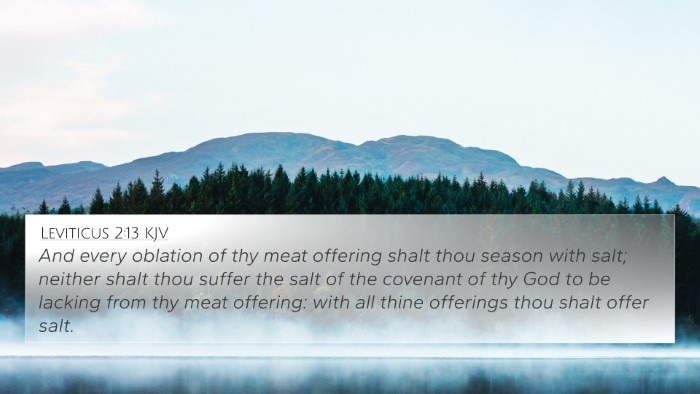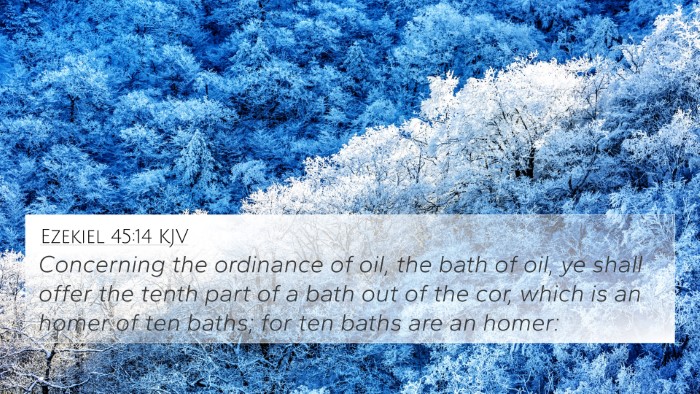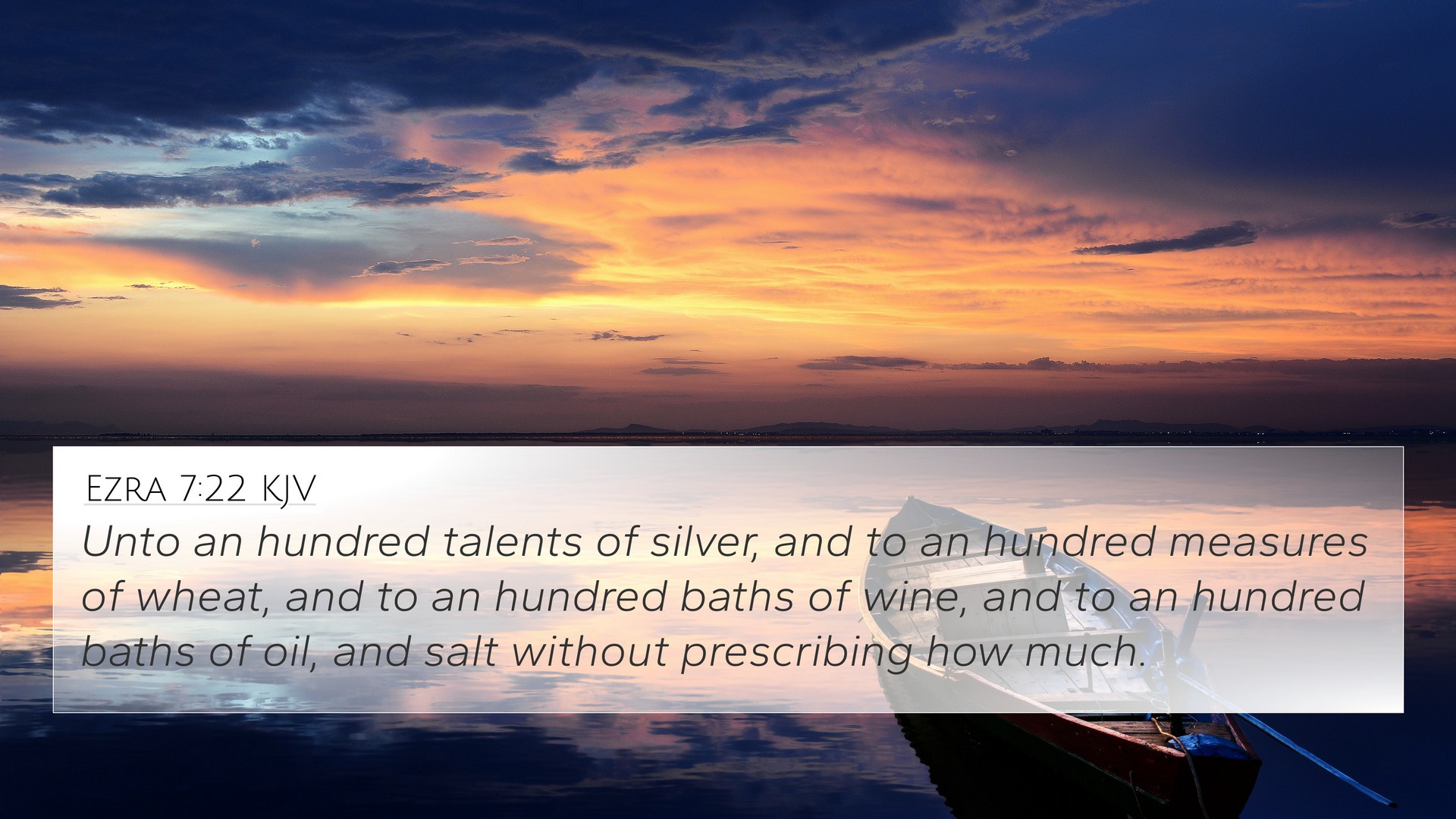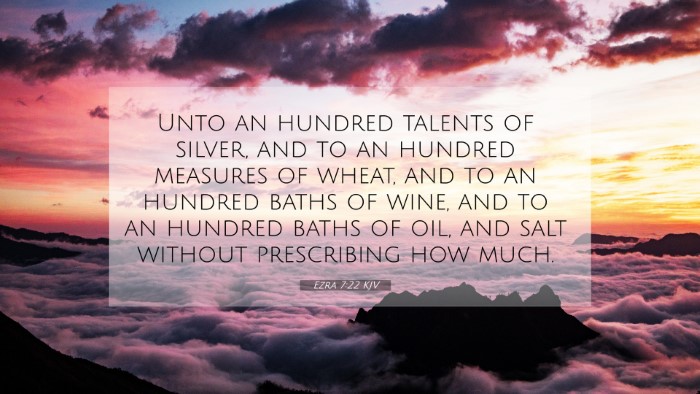Old Testament
Genesis Exodus Leviticus Numbers Deuteronomy Joshua Judges Ruth 1 Samuel 2 Samuel 1 Kings 2 Kings 1 Chronicles 2 Chronicles Ezra Nehemiah Esther Job Psalms Proverbs Ecclesiastes Song of Solomon Isaiah Jeremiah Lamentations Ezekiel Daniel Hosea Joel Amos Obadiah Jonah Micah Nahum Habakkuk Zephaniah Haggai Zechariah MalachiEzra 7:22 Similar Verses
Ezra 7:22 Cross References
Unto an hundred talents of silver, and to an hundred measures of wheat, and to an hundred baths of wine, and to an hundred baths of oil, and salt without prescribing how much.
Uncover the Rich Themes and Topics of This Bible Verse
Listed below are the Bible themes associated with Ezra 7:22. We invite you to explore each theme to gain deeper insights into the Scriptures.
Ezra 7:22 Cross Reference Verses
This section features a detailed cross-reference designed to enrich your understanding of the Scriptures. Below, you will find carefully selected verses that echo the themes and teachings related to Ezra 7:22 KJV. Click on any image to explore detailed analyses of related Bible verses and uncover deeper theological insights.

Leviticus 2:13 (KJV) »
And every oblation of thy meat offering shalt thou season with salt; neither shalt thou suffer the salt of the covenant of thy God to be lacking from thy meat offering: with all thine offerings thou shalt offer salt.

Ezekiel 45:14 (KJV) »
Concerning the ordinance of oil, the bath of oil, ye shall offer the tenth part of a bath out of the cor, which is an homer of ten baths; for ten baths are an homer:

Luke 16:6 (KJV) »
And he said, An hundred measures of oil. And he said unto him, Take thy bill, and sit down quickly, and write fifty.
Ezra 7:22 Verse Analysis and Similar Verses
Understanding Ezra 7:22
Ezra 7:22 states: "And whatever else is commanded by the God of heaven shall be done diligently for the house of the God of heaven; for why should there be wrath against the realm of the king and his sons?" This verse is rich in meaning and provides profound insights into the responsibilities of those who serve the Lord, particularly in leadership roles.
Summary of Biblical Context
In the context of Ezra's mission to lead a group of exiles back to Jerusalem, this verse reflects the seriousness with which he addresses the commands of God. Ezra, a scribe and priest, is tasked with enforcing the Law among the returned exiles, emphasizing the need for diligence in adhering to divine instructions.
Commentary Insights
Matthew Henry's Commentary
Matthew Henry emphasizes the importance of obeying God's commands, particularly within the sphere of governance and spiritual leadership. He interprets Ezra's directive as a reminder that divine wrath can be incurred when God's ordinances are neglected. Furthermore, Henry points out that Ezra recognizes the potential consequences of disobedience, particularly for the king and his family, underscoring the interdependence of spiritual and earthly authorities.
Albert Barnes' Notes
Albert Barnes highlights that Ezra's suggestion to follow the commands of God is not merely advice but a directive that has implications for both religious and secular realms. He elaborates on how diligence in divine matters can lead to peace and favor from both God and rulers. Barnes further supports the view that reverence for God translates into greater loyalty and stability for the kingdom, creating a solid foundation for governance.
Adam Clarke's Commentary
Adam Clarke offers a detailed interpretation by noting that Ezra promotes an understanding of the relationship between worship and governance. He suggests that spiritual negligence can result in divine displeasure that affects the nation at large. Clarke emphasizes the necessity for compliance with God’s commands as a source of safety and prosperity for both the people and their leaders, linking spiritual fidelity to national well-being.
Cross-References
Ezra 7:22 connects with several other scripture passages, providing a network of biblical references that enhance understanding:
- Deuteronomy 28:1-15 - Discusses blessings for obedience to God.
- 2 Chronicles 7:14 - Calls for humility and obedience to invoke healing and restoration.
- Nehemiah 1:11 - Reflects a similar dedication to God's commands in the rebuilding efforts.
- Proverbs 16:7 - Illustrates that when one's ways please the Lord, even enemies will be at peace.
- Isaiah 1:18-20 - Highlights the consequences of obedience versus disobedience.
- Romans 13:1-2 - Mentions the relationship between divine authority and earthly rulers.
- 1 Peter 2:13-15 - Encourages submission to earthly authorities for the Lord’s sake.
Thematic Connections
This verse taps into a broader theme of spiritual responsibility among leaders. Cross-referencing it with related verses reveals a pattern where adherence to divine guidance is intrinsically linked to societal prosperity and order:
- Spiritual Leadership: Emphasizing the role of leaders in upholding God's laws.
- Divine Judgement: Highlighting the consequences of turning away from God's paths.
- National Identity: The connection between faith and national wellbeing.
Practical Applications
The message of Ezra 7:22 remains relevant today as it encourages individuals, particularly those in positions of authority, to advocate for righteousness in their decisions. By integrating the principles found in this verse into contemporary leadership, one can foster an atmosphere of respect for spiritual mandates, thereby enhancing the integrity of governance.
Conclusion
The profound implications of Ezra 7:22 extend beyond historical context, offering enduring lessons on the significance of aligning earthly governance with heavenly mandates. By employing tools for bible cross-referencing and examining the connections between Bible verses, we can gain deeper insights into the nature of divine authority, human responsibility, and the reciprocal effects they have on society.


